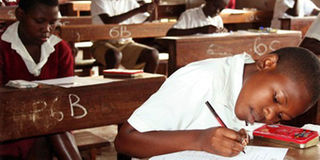Prime
Go slow on World Bank proposal to scrap PLE

Pupils sitting for PLE recently. FILE PHOTO
What you need to know:
The issue: Scrapping PLE.
Our view: We do agree that Uganda has quite a high school dropout rate. But the assumption that parents do not encourage their children to stay in school “because they know there are no results” is very misleading.
On Thursday, the World Bank’s advisor on Global Education Practice, Mr Mourad Ezzine, recommended that government scraps the Primary Leaving Examinations (PLE) to save $82 million (approximately Shs306.4 billion), which he claimed is lost to what he described as unproductive education. His argument is that many children leave in the middle of primary education when they are still illiterate.
Mr Ezzine claimed that the “quality of teaching and learning is not good” and that “parents know that the children are not learning”. Mr Ezzine’s comments are to say the least absurd.
We do agree that Uganda has quite a high school dropout rate. For example, out of the 1,837,277 pupils who enrolled for Primary One in schools across the country in 2004, only 102,858 sat for the Uganda Advanced Certificate of Education (UACE) in 2016, which would represent a 94 per cent dropout rate.
First of all, the research that arrived at that figure did not take into consideration those who joined community polytechnics after their PLE.
Secondly, making primary and secondary education as part of the same compulsory foundational education does not provide guarantees that those who enrol for that foundational education will not drop out of school at some point. Will the World Bank then come and recommend scrapping of the Uganda Certificate of Education (UCE) examinations if we register dropouts at that level?
The assumption that parents are not supportive of their children or do not encourage them to stay in school “because they know there are no results” is very misleading. The reality is that some parents are not encouraging their children to stay in school because of economic pressures.
A parent who on account of dire economic situation in which he finds himself in, cannot afford to provide his family with a decent meal, will certainly not be able to afford scholastic materials or cater for the child’s feeding while at school. Such a parent will often times look the other side and let the child be even if deep down that parent would have loved to see the child in school.
There are several other families out there who are forcing children to get employed in sugarcane estates, tea plantations or rudimentary mines and it is not because they do not value education. They do, but the economic realities in which we leave compel them to put their personal economies ahead of education. What Uganda needs from the World Bank is advice on how to improve the economy so that it works for all.




